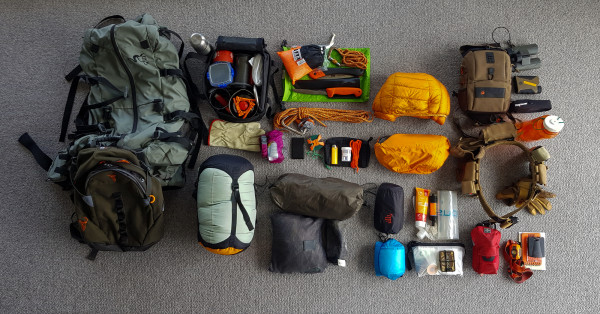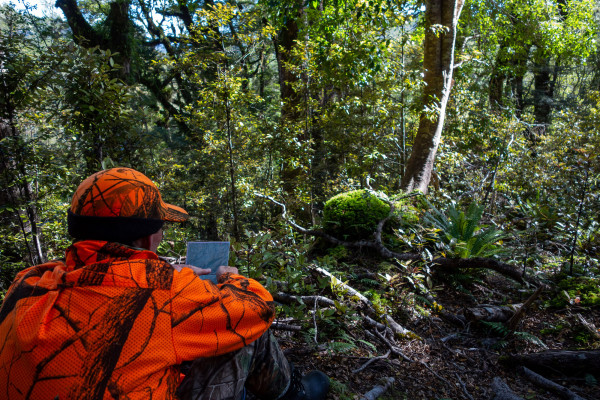Planning for the unexpected | Survival & backcountry hunting basics
While you never ‘plan’ to spend an unexpected night out in the bush; or sprain an ankle while backcountry, or take a spill down a bank, or cut yourself open while dressing out a deer, or a multitude of things that could happen, it’s still a great idea to have a plan, and some resources, should something unexpected occur.
Guest Blog from Kerry Adams: Kerry has an extensive background in firearms and the outdoors, leaning a lot towards safety education. As one of the NZ Mountain Safety Council Firearms Instructors, he is constantly in front of new shooters and hunters, and finds himself driven to help however he can to get them started. While he doesn't get out to hunt as much these days (young kids) - he is at the range most weeks, setting up firearms for clients as well as teaching them how to shoot them. He has previously been involved with the Deerstalkers, LandSAR and most recently FieldShooting NZ. You can check out more of what he is up to over at goodblokes.nz - say hello!
I have spent a couple of nights in the bush under an emergency blanket – though all as training exercises, and there is one thing I can tell you, it’s generally quite cold!
I learnt a very valuable lesson early on in my outdoors experience. One night, on a Bushcraft 101 course through the NZ Mountain Safety Council, we headed out to do some night navigation and get a sense of what it was like to tramp in the dark. After walking out from the hut to an observation point, the instructor turned around, and simply pointed out something.
They asked – “if something were to happen right now, what gear do you have on you to help out?”.
This was followed by the astute observation – “most of you all just walked away from all of your gear, backpack, shelter, food, everything. Oh, and incidentally – who else actually knows you are out here?”
This was the trip that got me seriously thinking about emergency kit and trip planning.
Planning starts before the trip
Obviously, really. Yes, many trips are seemly put together at the last moment – a date might be set in advance, but things are not always properly sorted until the day or two before heading away.
After a few trips, you likely already know the basics of what to pack, maybe even where you are going if you are returning to a familiar hunting spot. Likely (hopefully) you have done some research on the area you are heading into, read up about the tracks to get there, the hut you might be staying at – talked to people that have been there before – prior experience is a great resource to tap into.
In addition, there are a couple of key things you need to do before you head out.
- The Plan My Walk app is a great resource from the MSC. While it might not have your hunting spot in there, it does have a lot of walks around the country – as well as weather, kit lists and more. It prompts you do a lot of the following as well.
- Check the weather. MetService is an obvious choice for this – know what to expect – and – if it’s looking rough – know when to pull the pin and go out another time. It’s also good to understand the predominant wind direction and plan your hunt accordingly (i.e. you want to be up wind from prime hunting spots)
- Let someone know where you are going, when you are expected back, and what to do if you don’t return when expected – ‘Plan My Walk’ from the NZ Mountain Safety Council is a great option here. Alternatively - I give my primary contact a copy of a map of the area with where I am planning on parking, walking, camping and hunting on it. They know when I leave and when I am expected back – normally with a 24-hour window in case I get held up or decide to stay another night.

Check your kit. It’s a good idea to:
- Check and replace batteries in torches, GPS units, rangefinders and anything else that is going to ruin your day if it dies on you. I put fresh batteries in my kit, regardless of when or if it was used on the last trip.
- Check the PLB (because at this point, I want to assume you are carrying one) – if you haven’t tested that battery in a while, or, the unit has expired (they do) – then get it sorted before you head out.
- Hunting? Is you gun properly zeroed? I never ceases to amaze me that people only pull their rifle out once or twice a year for a hunt, and never think to head down to the range beforehand to confirm their firearm (and themselves) still shoots ok.
- Check your waterproof gear is still, indeed waterproof – old and dirty kit can often loose its ability to bead off water – which means waterlogged, and potentially cold times for the wearer.
- Pack at least an extra day’s food. An extra couple of freeze-dried meals weights virtually nothing – and it’s a great just in case to have. I always keep extras in the truck as well – as well as a change of clothes and a couple of wool blankets.

Sit down and talk hunting plans, camping plans and importantly – firearms safety plans with your fellow hunters.
- Decide ‘rules of engagement’ – set some intents as to what you want to shoot, what you don’t want to shoot. If a newer hunter wants anything, well and good, if you are all after trophies, also good – but talk about it – it helps focus what you are after and starts the process of positively identifying your target before you even head into the bush! If you are planning on splitting up groups (I don’t recommend splitting up if there is just two of you) – then ensure each party has their own PLB or communications system (Garmin Rhinos, UHF Radios both come to mind).
- Camping plans could mean you can share some equipment and weight for the basecamp, or, I have also been on trips where everyone seems runs self-sufficient. You might have extra gear you can loan, or, not have to buy something and borrow a spare one off a mate. Don’t split critical gear – like one story I heard of one guy taking the map and the other the compass – you all need one!
- Firearms Safety – I recommend only one active hunter within the party at any time. In addition, talk about how the rest of the guys are carrying their firearms – the ‘state’ of carry and the like.
These discussions clear up any potential confusion or conflict once you are out there – if you have questions – it’s much better to bring them up before you find yourself in a situation and must make decisions on the fly.
As they say, prior planning prevents poor performance.
While no-one plans for things to go wrong, it’s good to plan a plan, in case it does.
Thanks for sharing your tips and photos Kerry! New Zealand's outdoors provides exciting opportunities for all types of people and everyone has their own way of preparing for it. We hope readers can take away a few tips of their own from this or feel free to share your own tips with us.
Want to learn more from others?
- Check out the other stories from folks and their experiences in the outdoors on our Stories section of our website.